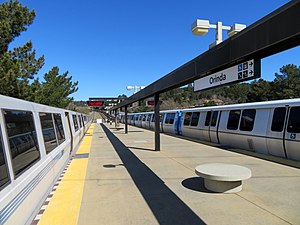Orinda station
Orinda | |||||||||||
|---|---|---|---|---|---|---|---|---|---|---|---|
 Two trains at Orinda station in March 2018 | |||||||||||
| General information | |||||||||||
| Location | 11 Camino Pablo Orinda, California | ||||||||||
| Coordinates | 37°52′42″N 122°11′01″W / 37.878427°N 122.18374°W | ||||||||||
| Line(s) | BART C-Line | ||||||||||
| Platforms | 1 island platform | ||||||||||
| Tracks | 2 | ||||||||||
| Connections | |||||||||||
| Construction | |||||||||||
| Structure type | Elevated | ||||||||||
| Parking | 1,406 spaces | ||||||||||
| Bicycle facilities | 24 lockers | ||||||||||
| Accessible | Yes | ||||||||||
| Architect | Gwathmey, Sellier & Crosby Joseph Esherick & Associates[1] | ||||||||||
| History | |||||||||||
| Opened | May 21, 1973 | ||||||||||
| Passengers | |||||||||||
| 2024 | 1,266 (weekday average)[2] | ||||||||||
| Services | |||||||||||
| |||||||||||
| |||||||||||
Orinda station is a Bay Area Rapid Transit station in Orinda, California. The station has an island platform in the center median of State Route 24. It is served by the Yellow Line. An abstract mural by Win Ng, partially covered by advertisements, is located in the fare lobby.[3]
History
[edit]
The BART Board approved the name "Orinda" in December 1965.[4] Service at the station began on May 21, 1973, following the completion of the Berkeley Hills Tunnel, which connects it to Rockridge station.[5] AC Transit began operating local bus service under contract in central Contra Costa County in the 1970s after the coming of BART. Service began in Moraga and Orinda on September 13, 1976.[6] The service was transferred to County Connection on June 7, 1982.[7]
In 2008, BART added solar panels over parking areas at Orinda station, as well as the Richmond and Hayward maintenance yards. The $3.8 million project was expected to provide all station electrical needs during daylight hours.[8]
Thirteen BART stations, including Orinda, did not originally have faregates for passengers using the elevator. In 2020, BART started a project to add faregates to elevators at these stations. Orinda was the last station to be modified; the new faregate in the lobby was installed in July 2023.[9]
BART operates and maintains the surface parking lots at the station, but does not own them. As of 2024[update], BART indicates "significant market, local support, and/or implementation barriers" that must be overcome to allow transit-oriented development on the parking lots. Such development would not begin until at least the mid-2030s.[10]
Notes
[edit]- ^ Cerny, Susan Dinkelspiel (2007). An Architectural Guidebook to San Francisco and the Bay Area (1st ed.). Layton, UT: Gibbs Smith. pp. 501–502. ISBN 978-1-58685-432-4. OCLC 85623396.
- ^ "Monthly Ridership Reports". San Francisco Bay Area Rapid Transit District. June 2024.
- ^ Weinstein, Dave. "How BART got ART". CA-Modern. Eichler Network. p. 2.
- ^ "Names Approved for 38 Rapid Transit Stations Around Bay". Oakland Tribune. December 10, 1965. p. 10 – via Newspapers.com.
- ^ "BART Chronology January 1947 – March 2009" (PDF). San Francisco Bay Area Rapid Transit District. March 2009. Archived from the original (PDF) on October 13, 2013.
- ^ History of Lines by Line: Major Changes Since 1960 (PDF). Alameda-Contra Costa Transit District). July 17, 1978. pp. 5, 12.
- ^ "Will extra miles dim the smiles of genial county service?". The San Francisco Examiner. June 1, 1982. p. 3 – via Newspapers.com.
- ^ "BART goes solar, saving a projected $3.4 million over 20 years" (Press release). San Francisco Bay Area Rapid Transit District. July 10, 2008.
- ^ "New Fare Gates & Station Hardening". San Francisco Bay Area Rapid Transit District. July 2023. Archived from the original on September 4, 2023.
- ^ BART Transit-Oriented Development Program Work Plan: 2024 Update (PDF). San Francisco Bay Area Rapid Transit District. March 2024. p. 17.
External links
[edit]![]() Media related to Orinda station at Wikimedia Commons
Media related to Orinda station at Wikimedia Commons

